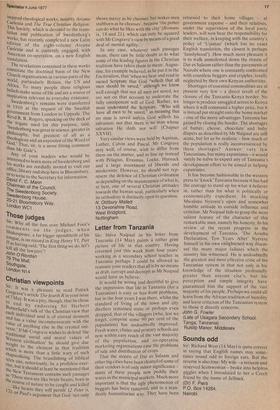Letter from Tanzania
Sir: Shiva Naipaul in his letter from Tanzania (14 May) paints a rather grim picture of life in that country. Having returned just this week from four years' working as a secondary school teacher in Tanzania perhaps I could be allowed to reassure your readers that all is by no means as drab, corrupt and decrepit as Mr Naipaul would have us believe.
It would be wrong and deceitful to give the impression that life in Tanzania (for a Tanzanian) is easy or free from problems, but in the four years I was there, whilst the standard of living of the town and city dwellers remained static or perhaps even dropped, that of the villagers (who, lest we forget, comprise some 90 per cent of the population) has undoubtedly improved. Fresh water, clinics and primary schools are now within easy reach of the vast majority of the population, and co-operative marketing organisations ease the problems of sale and distribution of crops.
That the streets of Dar es Salaam and other big cities have been cleared of some of their vendors is of only minor significance — many of these people now peddle their wares in the municipal markets. Much more important is that the ugly phenomenon of beggars has been removed, and in a manifestly. humanitarian way. They have been returned to their home villages — at government expense — and their relatives, under the supervision of the local party leaders, will now bear the responsibility for their welfare, in keeping with the country's policy of `Ujamaa' (which has' no exact English translation, the closest is perhaps lamilyhood'). How much more pleasant it is to walk unmolested down the streets of Dar es Salaam rather than the pavements of Nairobi where one is constantly confronted with countless beggars and cripples, totally neglected by their own Kenyan.authorities.
Shortages of essential commodities are at present very few — a direct result of the closure of the Tanzania-Kenya border. No longer is produce smuggled across to Kenya where it will command a higher price, but it is instead put straight onto the home market — one of the many advantages Tanzania has gained by closing the border. The shortages of butter, cheese, chocolate and baby diapers as described by Mr Naipaul are still acute, but let us be realistic — how much of the population is really inconvenienced by these shortages? Answer: very few Tanzanians, but many expatriates — it would surely be naive to expect any of Tanzania's development effort to be aimed at helping expatriates.
It has become fashionable in the western press to 'knock' Tanzania because it has had the courage to stand up for what it believes in, rather than for what is politically or economically expedient. In mocking Mwalimu Nyerere's open and somewhat humble attitude to outside influence and criticism, Mr Naipaul fails to grasp the most salient feature of the character of this remarkable man, namely his honesty. In his review of the recent progress in the development of Tanzania, 'The Arusha Declaration, Ten Years After' Nyercre himself in his own enlightened way discus seS the many major failures which the country has witnessed. He is undoubtedly the greatest and most effective critic of the Tanzanian system in that not only is his knowledge of the situation profoundly greater than anyone else's, but his perception and simple integrity have guaranteed him the support of the vast majority of his people. Perhaps we could all learn from the African tradition of humility and leave criticism of the Tanzanian system to those it directly concerns.
John G. Fowler (Late of Usagara Secondary School, Tanga, Tanzania) Ruislip Manor, Middlesex


































 Previous page
Previous page